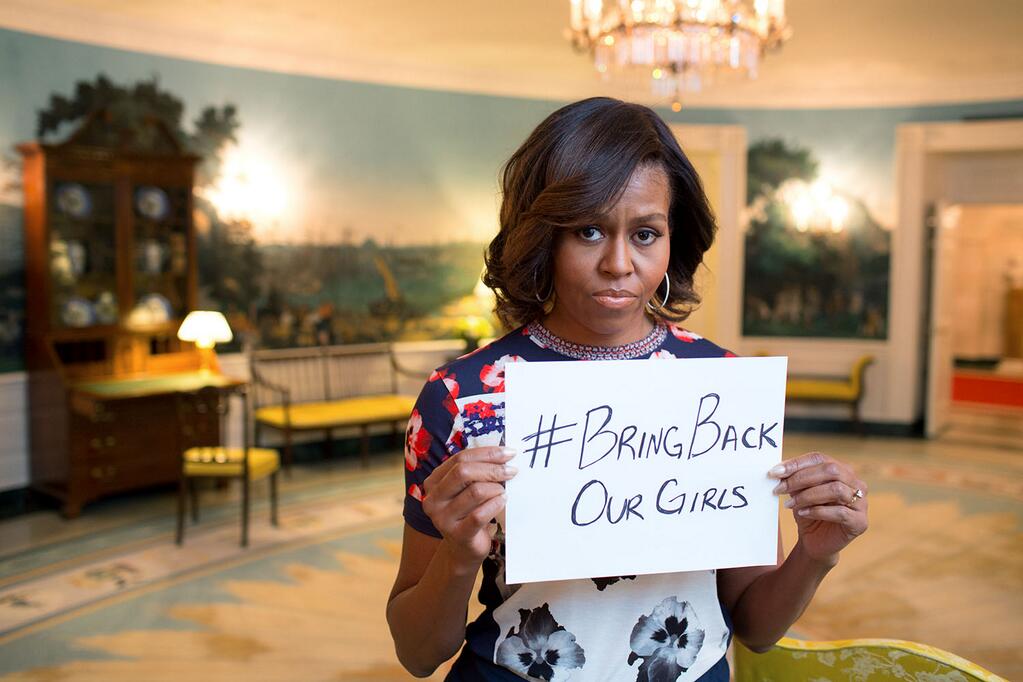WASHINGTON – It’s been a month since the world learned of 270 girls kidnapped by Islamist terror group Boko Haram. The online community has taken action, with 3 million mentions of the #BringBackOurGirls hashtag, spurred on a high-profile endorsement from first lady Michelle Obama.
But can a simple hashtag make a difference in a region long beset by insurgency and instability? And with Americans less interested than ever in entanglements abroad, can the international community do anything beyond what the hashtag asks?
“Nigeria is a crucial strategic country of vital importance for West Africa and all of Africa, but the state is weak and cracking,” says Vanda Felbab-Brown, a senior fellow in security and intelligence at the Brookings Institution. “It has never been strong, it has always been very corrupt, very criminalized, with very fluid boundaries between state and crime.”
The kidnapping is the latest in a long line of Boko Haram attacks dating back to 2009. The group, the name of which translates to “Western education is sin,” advocates a radical brand of Islam that opposes Western science as well as education for women.
Boko Haram killed more than 1,000 Nigerians in 2014 alone, making it one of the deadliest insurgencies in Africa. On the same day as the kidnapping, a Boko Haram bombing killed 75 people in the capital city of Abuja and wounded more than 100. Just last week, the group killed more than 300 in an attack on the northeastern city of Gamboru.
Boko Haram has been allowed to thrive in the northeast of the country due to government indifference in the region. But the international attention surrounding the kidnapping has goaded the Nigerian government to accept offers of aid. The U.S. now has a small multidisciplinary team of military and intelligence experts on the ground, aided by surveillance aircraft and drones.
“The U.S. and the Brits are finding a very uninterested, lukewarm partner in Nigeria,” says Felbab-Brown. “The insurgency has been very vicious, resulting in great tragedy and a major threat to the state in the north for years, and the president just couldn’t be bothered.”
When the military does respond to Boko Haram attacks, it does so with a brutality that undermines civilian trust in the state.
“The approach has been both extremely brutal, very ineffective – counterproductive, in fact – and really not interested in engaging with the U.S.,” says Felbab-Brown.
The Nigerian military has fought the insurgency by razing entire villages and slaughtering suspected Boko Haram by the hundreds, paying little attention to proving their involvement in the group, explains Felbab-Brown. Partnering with this military has proved difficult for American troops and foreign service officers, according to the Defense Department, because they are barred from assisting units that have committed human rights violations.
With little trust in the national government and limited opportunities for international assistance, the responsibility to oppose Boko Haram in the long term falls to civilians, who must create an environment inhospitable to the insurgency.
“In our view, there’s a real need to really emphasize energy at a community level, not just leave it at a government-to-government relationship,” says Mike Jobbins, program manager for Search for Common Ground, a global violence prevention organization with a presence in sub-Saharan Africa. “We need to support the hundreds of thousands of Nigerians living in these areas who have seen their communities destroyed, and make sure were not leaving it at a hard security level, but there’s also a human security element of response to the crisis.”
He says local communities must take the initiative to resist Boko Haram in the absence of government resources. But leaders in the north know Boko Haram’s power and brutality, and don’t trust the central government to protect them should the group retaliate.
At a certain point, external intervention does more harm than good, undermining public trust in local government.
“At the center of it all it needs to be ordinary men, women, children and religious leaders who are in those communities themselves to feel like it’s their process,” says Jobbins. Without a lasting effort against the Boko Haram insurgency, there is every possibility that this won’t be the group’s last kidnapping.
Some may remember the last hashtag-driven U.S. intervention in Africa. The #Kony2012 video, released by antiviolence nonprofit Invisible Children, introduced 100 million people worldwide to Ugandan warlord Joseph Kony, leader of the Lord’s Resistance Army. The campaign drew an immediate backlash, as many complained that it oversimplified the problems facing the region and implied that only Western intervention could help central Africa.
But #BringBackOurGirls is different in its genesis. “It’s one of the first global, viral trends about Africa to begin in Africa and to enlist a lot of outside support,” says Jobbins. “It could be a turning point for Nigeria, and it could be a huge example for people around Africa about making their voices heard in a global stage. An African movement that shapes policy around the U.S. and around the world.”
The campaign also caught on outside of Africa because it is forward-looking. “We’ve read about killings and we’ve read about abuses after they happened, and after it’s too late to intervene. This opportunity to do something before the worst happens is something I think has driven a lot of the response,” says Jobbins.
Still, the outpouring of interest in Nigeria will only make a difference if it is sustained, Jobbins says. “It’s not just doing something for those girls particularly, but doing something for all girls and all boys who are coming of age in northeast Nigeria.”


